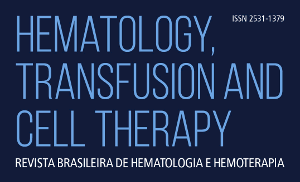Diarrhea is a major cause of morbidity during high-dose chemotherapy followed by autologous stem cell transplantation (ASCT). It occurs in almost half of recipients of ASCT and generally, it is attributed to the effects of high-dose chemotherapy on the gastrointestinal mucosa and the effects of broad-spectrum antibiotic regimens for the prophylaxis and treatment of neutropenia. However, other etiologies might be considered, such as viral, bacterial and parasitic infections.11 van Kraaij MG, Dekker AW, Verdonck LF, van Loon AM, Vinje J, Koopmans MP, et al. Infectious gastro-enteritis: an uncommon cause of diarrhoea in adult allogeneic and autologous stem cell transplant recipients. Bone Marrow Transplant. 2000;26(3):299-303.,22 Tuncer HH, Rana N, Milani C, Darko A, Al-Homsi SA. Gastrointestinal and hepatic complications of hematopoietic stem cell transplantation. World J Gastroenterol. 2012;18(16):1851-60.
Despite being the most common etiology of diarrhea after ASCT, the conditioning regime is seldom implicated in severe complications, with some exceptions. Cytarabine-containing regimens, high-dose melphalan (≥200 mg/m2), and regimens containing multiple alkylating agents may cause more severe diarrhea.33 Cox GJ, Matsui SM, Lo RS, Hinds M, Bowden RA, Hackman RC, et al. Etiology and outcome of diarrhea after marrow transplantation: a prospective study. Gastroenterology. 1994;107(5):1398-1407.
Conversely, infectious causes of diarrhea are less prevalent than damage from conditioning therapy. Clostridium difficile is considered the leading cause of infectious diarrhea among hospitalized patients and is a major concern in immunosuppressed individuals.44 Alonso CD, Dufresne SF, Hanna DB, Labbe AC, Treadway SB, Neofytos D, et al. Clostridium difficile infection after adult autologous stem cell transplantation: a multicenter study of epidemiology and risk factors. Biol Blood Marrow Transplant. 2013;19(10):1502-8. Viruses such as cytomegalovirus (CMV) and some serotypes of adenovirus might also be implicated in diarrhea after ASCT, but rarely cause life-threatening complications. Diarrhea secondary to intestinal parasite infection, such as Cryptosporidium, Giardia lamblia, Entamoeba histolytica and helminths, is rare among patients who come to transplant without diarrhea.55 Stein A, Voigt W, Jordan K. Chemotherapy-induced diarrhea: pathophysiology, frequency and guideline-based management. Ther Adv Med Oncol. 2010;2(1):51-63.,66 Bhat V, Vira H, Khattry N, Toshniwal M. Cryptococcus laurentii diarrhea post hematopoietic stem cell transplant. Transpl Infect Dis. 2017;19(2).Strongyloides infection and non-tuberculous mycobacterial have also been described after ASCT in patients from endemic areas.22 Tuncer HH, Rana N, Milani C, Darko A, Al-Homsi SA. Gastrointestinal and hepatic complications of hematopoietic stem cell transplantation. World J Gastroenterol. 2012;18(16):1851-60.
In this issue of Hematology, Transfusion and Cell Therapy, Castro et al. investigated the role of enteric pathogens in 47 recipients of ASCT between May 2011 and May 2013.77 de Castro MD, Chebli JM, Costa LJ, Alves KR, Atalla A, Hallack Neto AE. Infectious diarrhea in autologous stem cell transplantation: high prevalence of coccidia in a South American center. Hematol Transfus Cell Ther. 2018;40(2):132-5. Thirty-nine recipients (83%) met the criteria for the diagnosis of diarrhea. Among them, conditioning regime toxicity was the most prevalent cause (35%). Interesting, a high prevalence of infectious etiology was identified. Through an investigational platform based on parasitological stool examination, stool cultures and the identification of A and B C. difficile toxins, 30% of the recipients had an infectious cause as the etiology with Coccidia being the most common. Unexpectedly, C. difficile presented a low incidence in comparison with currently published data44 Alonso CD, Dufresne SF, Hanna DB, Labbe AC, Treadway SB, Neofytos D, et al. Clostridium difficile infection after adult autologous stem cell transplantation: a multicenter study of epidemiology and risk factors. Biol Blood Marrow Transplant. 2013;19(10):1502-8. but, in accordance with the frequency and microbiological causes of diarrhea in low-middle income countries.88 Pala C, Kaynar L, Buyukoglan R, Kurnaz F, Metan G, Yazar S, et al. Diarrhea in peripheral stem cell transplant recipients: a developing country's experience. J Infect Dev Ctries. 2014;8(5):635-41.
These results revealed some potential different etiologies of infectious diarrhea in Brazil. However, due to the low number of patients evaluated from a single center, conclusions should be taken with caution. Nevertheless, these data might justify a multicenter study with the aim to clarify etiologies of diarrhea among Brazilian patients. A careful analysis of the causative agents could lead to more accurate management, early intervention and prevention of severe complications.
-
☆
See paper by Marcelo Dias de Castro et al. on pages [132–135].
REFERENCES
-
1van Kraaij MG, Dekker AW, Verdonck LF, van Loon AM, Vinje J, Koopmans MP, et al. Infectious gastro-enteritis: an uncommon cause of diarrhoea in adult allogeneic and autologous stem cell transplant recipients. Bone Marrow Transplant. 2000;26(3):299-303.
-
2Tuncer HH, Rana N, Milani C, Darko A, Al-Homsi SA. Gastrointestinal and hepatic complications of hematopoietic stem cell transplantation. World J Gastroenterol. 2012;18(16):1851-60.
-
3Cox GJ, Matsui SM, Lo RS, Hinds M, Bowden RA, Hackman RC, et al. Etiology and outcome of diarrhea after marrow transplantation: a prospective study. Gastroenterology. 1994;107(5):1398-1407.
-
4Alonso CD, Dufresne SF, Hanna DB, Labbe AC, Treadway SB, Neofytos D, et al. Clostridium difficile infection after adult autologous stem cell transplantation: a multicenter study of epidemiology and risk factors. Biol Blood Marrow Transplant. 2013;19(10):1502-8.
-
5Stein A, Voigt W, Jordan K. Chemotherapy-induced diarrhea: pathophysiology, frequency and guideline-based management. Ther Adv Med Oncol. 2010;2(1):51-63.
-
6Bhat V, Vira H, Khattry N, Toshniwal M. Cryptococcus laurentii diarrhea post hematopoietic stem cell transplant. Transpl Infect Dis. 2017;19(2).
-
7de Castro MD, Chebli JM, Costa LJ, Alves KR, Atalla A, Hallack Neto AE. Infectious diarrhea in autologous stem cell transplantation: high prevalence of coccidia in a South American center. Hematol Transfus Cell Ther. 2018;40(2):132-5.
-
8Pala C, Kaynar L, Buyukoglan R, Kurnaz F, Metan G, Yazar S, et al. Diarrhea in peripheral stem cell transplant recipients: a developing country's experience. J Infect Dev Ctries. 2014;8(5):635-41.
Publication Dates
-
Publication in this collection
Apr-Jun 2018

